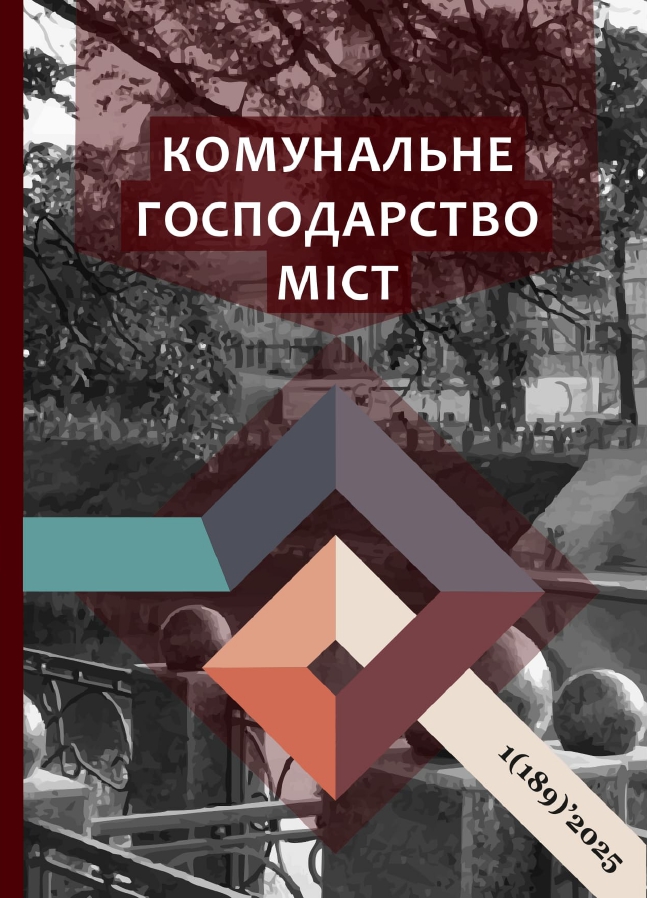ЕТАПИ ВПРОВАДЖЕННЯ АЛЬТЕРНАТИВНОГО ПАЛИВА ТА ЕКОІННОВАЦІЙ У МОРСЬКОМУ ТРАНСПОРТІ
DOI:
https://doi.org/10.33042/2522-1809-2025-1-189-447-454Ключові слова:
альтернативне паливо, екологія, судноплавство, природний газ, метанол, біопаливо, декарбонізація, моделюванняАнотація
Ця стаття аналізує перспективи впровадження альтернативного палива та екологічних технологій у морському транспорті. Розглядаються шляхи досягнення кліматичної нейтральності до 2050 року, акцентуючи увагу на зрідженому природному газі, метанолі, біопаливі та водні. Запропонована модель враховує екологічні, економічні й інфраструктурні аспекти.
Посилання
Solakivi, Tomi & Paimander, Aleksi & Ojala, Lauri. (2022). Cost competitiveness of alternative maritime fuels in the new regulatory framework. Transportation Research Part D: Transport and Environment, 5(42), 112-118.
Kouzelis, Konstantinos & Frouws, Koos & van Hassel, Edwin. (2022). Maritime fuels of the future: what is the impact of alternative fuels on the optimal economic speed of large container vessels. Journal of Shipping and Trade. (51), 305-310.
Carvalho, Francielle & Miranda Müller Drumond Casseres, Eduardo & Poggio, Matheus & Nogueira, Tainan & Fonte, Clarissa & Ken Wei, Huang & Portugal Pereira, Joana & Rochedo, Pedro & Szklo, Alexandre & Schaeffer, Roberto. (2021). Prospects for carbon-neutral maritime fuels production in Brazil. Journal of Cleaner Production. 2(29), 89-94
Franz, Sebastian & Campion, Nicolas & Shapiro-Bengtsen, Sara & Münster, Marie. (2022). Roadmap for sustainable fueling options in the maritime sector. Conference: World Maritime Technology Conference 2022. 9(47), 415-420
Huang, Jinjin & Fan, Hongjun & Xu, Xiangyang & Liu, Zheyu. (2022). Life Cycle Greenhouse Gas Emission Assessment for Using Alternative Marine Fuels: A Very Large Crude Carrier (VLCC) Case Study. Journal of Marine Science and Engineering. 4(38), 178-183
Heine, Dirk & GGde, Susanne & Dominioni, Goran. (2014). Unilaterally Removing Indirect Subsidies for Maritime Fuel. SSRN Electronic Journal. 6(45), 250-255
Livaniou, Styliani & Chatzistelios, Georgios & Lyridis, Dimitrios & Bellos, Evangelos. (2022). LNG vs. MDO in Marine Fuel Emissions Tracking. Sustainability. 8(50), 333-337.
Md Moshiul, Alam & Mohammad, Roslina & Hira, Fariha & Maarop, Nurazean. (2022). Alternative Marine Fuel Research Advances and Future Trends: A Bibliometric Knowledge Mapping Approach. Sustainability. 1(27), 55-60.
Seo, Youngkyun & Kim, Jintae & Park, Eunyoung & Lee, Jinkwang & Cho, Meangik & Han, Seongjong. (2022). Analysis of Energy Consumption of Novel Re-Liquefaction System Integrated with Fuel Supply System (FSS) for LPG-Fuelled LPG Carrier to Conventional Systems. Energies. 10(58), 512-518.
Nerheim, Ann Rigmor & Æsøy, Vilmar & Holmeset, Finn Tore. (2021). Hydrogen as a Maritime Fuel–Can Experiences with LNG Be Transferred to Hydrogen Systems?. Journal of Marine Science and Engineering. 3(40), 190-195.
Pekşen, Duygu & Alkan, Güler. (2018). Application of Alternative Maritime Power (AMP) Supply to Cruise Port. Journal of ETA Maritime Science. 6(44), 276-280.
Mallouppas, George & Ioannou, Constantina & Yfantis, Elias. (2022). A Review of the Latest Trends in the Use of Green Ammonia as an Energy Carrier in Maritime Industry. Energies. 5(37), 145-149.
Benet, Álvaro & Villalba-Herreros, Antonio & d'Amore-Domenech, Rafael & Leo, T.J.. (2022). Knowledge gaps in fuel cell-based maritime hybrid power plants and alternative fuels. Journal of Power Sources. 8(53), 367-372.
Christodoulou, Anastasia & Cullinane, Kevin. (2022). Potential alternative fuel pathways for compliance with the ‘FuelEU Maritime Initiative’. Transportation Research Part D: Transport and Environment. 9(49), 401-405.
Barberi, Salvatore & Campisi, Tiziana & Neduzha, Larysa. (2022). The role of cold ironing in maritime transport emissions. AIP Conference Proceedings. 2(30), 78-83.
Wang, Qiuwen & Zhang, Hu & Huang, Jiabei & Zhang, Pengfei. (2023). The use of alternative fuels for maritime decarbonization: Special marine environmental risks and solutions from an international law perspective. Frontiers in Marine Science. 7(46), 289-293.
Melnik, O., Onishchenko, S., Onishchenko, O., Shumilo, O., Voloshin, A., Ocheretna, V., Fedorenko, O. (2024). Research into the development of alternative types of fires and technologies in maritime transport. Studies in Systems, Decision and Control, 4(39), 13–21.
Ship fuel of the future. Comparison and prospect. Online source. Available at: https://sudostroenie.info/novosti/23327.html
Alternative fuels and technologies for greener shipping (2018) DNV GL. Summary of an assessment of selected alternative fuels and technologies. Online source. Available at: https://www.dnv.com
Maritime Safety Agency (2022). Update on potential of biofuels in shipping, EMSA, Lisbon. Online source. Avaiable at https://www.emsa.europa.eu/publications/reports/item/4834-update-on-potential-of-biofuels-for-shipping.html
##submission.downloads##
Опубліковано
Як цитувати
Номер
Розділ
Ліцензія
Автори, які публікуються у цьому збірнику, погоджуються з наступними умовами:
- Автори залишають за собою право на авторство своєї роботи та передають журналу право першої публікації цієї роботи на умовах ліцензії CC BY-NC-ND 4.0 (із Зазначенням Авторства – Некомерційна – Без Похідних 4.0 Міжнародна), котра дозволяє іншим особам вільно розповсюджувати опубліковану роботу з обов'язковим посиланням на авторів оригінальної роботи та першу публікацію роботи у цьому журналі.
- Автори мають право укладати самостійні додаткові угоди щодо неексклюзивного розповсюдження роботи у тому вигляді, в якому вона була опублікована цим журналом (наприклад, розміщувати роботу в електронному сховищі установи або публікувати у складі монографії), за умови збереження посилання на першу публікацію роботи у цьому журналі.
- Політика журналу дозволяє і заохочує розміщення авторами в мережі Інтернет (наприклад, у сховищах установ або на особистих веб-сайтах) рукопису роботи, як до подання цього рукопису до редакції, так і під час його редакційного опрацювання, оскільки це сприяє виникненню продуктивної наукової дискусії та позитивно позначається на оперативності та динаміці цитування опублікованої роботи (див. The Effect of Open Access).

